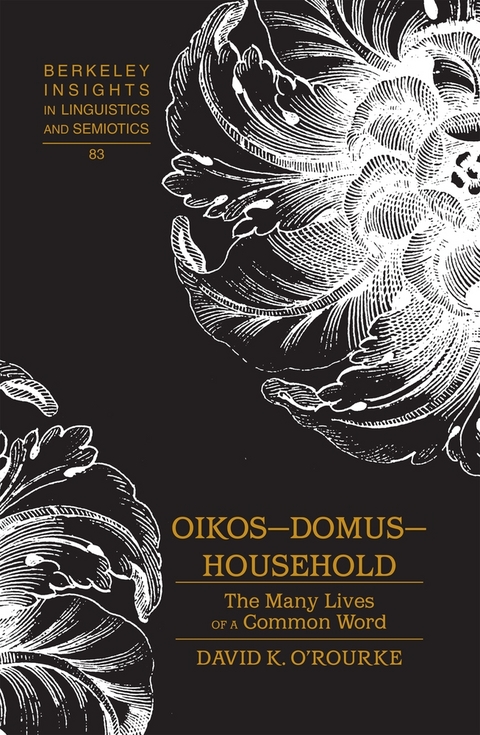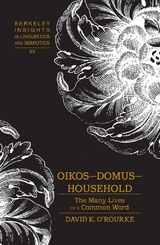Oikos – Domus – Household
The Many Lives of a Common Word
Seiten
2013
|
New edition
Peter Lang Publishing Inc (Verlag)
978-1-4331-1577-6 (ISBN)
Peter Lang Publishing Inc (Verlag)
978-1-4331-1577-6 (ISBN)
Describes historic episodes in the lives of these words, from the Greek oikos and Roman domus to our current family and home. This title describes how these words and their equivalents, home and family, are used as metaphors to illustrate how people who count are supposed to live and also to justify disinterest in people who do not count.
Oikos – Domus – Household: The Many Lives of a Common Word describes historic episodes in the lives of these words, from the Greek oikos and Roman domus to our current family and home. The episodes highlight their function as controlling metaphors used very differently from culture to culture, but often as ways to control basic issues, like the context in which women become pregnant and the control of land and its transmission to heirs. This book also describes how these words and their current equivalents, home and family, are used as metaphors to illustrate how people who count are supposed to live and also to justify disinterest in people who do not count.
One of the most important functions of the household is providing a dependable context in which pregnancy can be controlled. It describes how another key interest, continuing the male line, is embodied. Currently family is a politically useful, normative fiction. Family and home have little concrete meaning other than as metaphors for how people are supposed to live. There is no consistent meaning for these words from one era and one culture to another.
Each episode is described on its own trying to avoid «history by hindsight.» There are no attempts to trace causes from one time or event to another, but rather an attempt, to the limited extent possible, to describe episodes seen within their own contexts and mindsets. However, the fact that women can now have control over their own pregnancy is seen as a radical change in the role and definition of family and household.
Oikos – Domus – Household: The Many Lives of a Common Word describes historic episodes in the lives of these words, from the Greek oikos and Roman domus to our current family and home. The episodes highlight their function as controlling metaphors used very differently from culture to culture, but often as ways to control basic issues, like the context in which women become pregnant and the control of land and its transmission to heirs. This book also describes how these words and their current equivalents, home and family, are used as metaphors to illustrate how people who count are supposed to live and also to justify disinterest in people who do not count.
One of the most important functions of the household is providing a dependable context in which pregnancy can be controlled. It describes how another key interest, continuing the male line, is embodied. Currently family is a politically useful, normative fiction. Family and home have little concrete meaning other than as metaphors for how people are supposed to live. There is no consistent meaning for these words from one era and one culture to another.
Each episode is described on its own trying to avoid «history by hindsight.» There are no attempts to trace causes from one time or event to another, but rather an attempt, to the limited extent possible, to describe episodes seen within their own contexts and mindsets. However, the fact that women can now have control over their own pregnancy is seen as a radical change in the role and definition of family and household.
David K. O’Rourke writes extensively in the area of cultural history with an emphasis on the destructive power of social idealisms. Most recently he co-wrote and produced the documentary film
Contents: The Classical Background – Households in Post Roman Europe – The Rise of the Household World – The Multiple Births of the American Households.
| Reihe/Serie | Berkeley Insights in Linguistics and Semiotics ; 83 | Berkeley Insights in Linguistics and Semiotics ; 83 |
|---|---|
| Verlagsort | New York |
| Sprache | englisch |
| Maße | 155 x 230 mm |
| Gewicht | 400 g |
| Themenwelt | Sachbuch/Ratgeber ► Gesundheit / Leben / Psychologie ► Familie / Erziehung |
| Geisteswissenschaften ► Religion / Theologie | |
| Geisteswissenschaften ► Sprach- / Literaturwissenschaft ► Sprachwissenschaft | |
| Sozialwissenschaften ► Ethnologie ► Völkerkunde (Naturvölker) | |
| Sozialwissenschaften ► Soziologie ► Gender Studies | |
| ISBN-10 | 1-4331-1577-8 / 1433115778 |
| ISBN-13 | 978-1-4331-1577-6 / 9781433115776 |
| Zustand | Neuware |
| Haben Sie eine Frage zum Produkt? |
Mehr entdecken
aus dem Bereich
aus dem Bereich
das Handbuch für die individuelle Impfentscheidung
Buch | Softcover (2023)
Knaur MensSana (Verlag)
CHF 31,90
Born to be wild: Wie die Evolution unsere Kinder prägt. Mit einem …
Buch | Hardcover (2022)
Kösel (Verlag)
CHF 33,90
das Mitmachbuch für Kinder
Buch | Softcover (2023)
Yes Publishing (Verlag)
CHF 23,90




